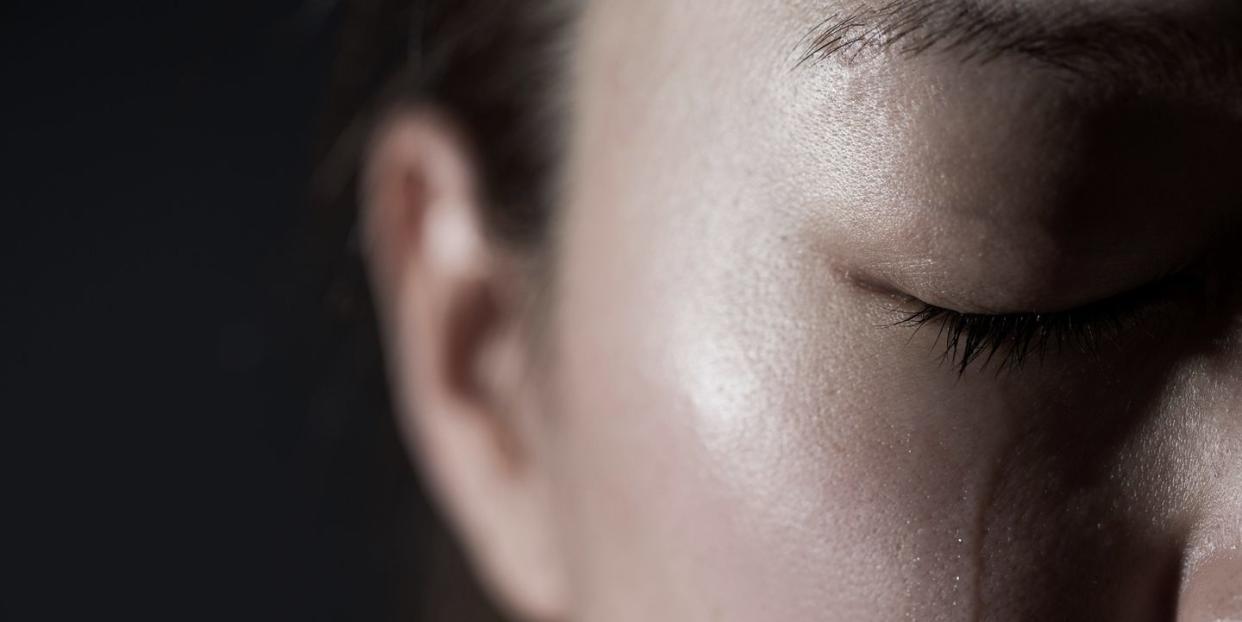Why Does My Head Hurt So Much After Crying?

Sometimes a good, hard cry feels downright therapeutic; other times, it’s just plain awful.
Never mind the emotional drainage (which is bad enough, TBH)-if you're lucky, flat-out bawling just means bloodshot eyes, a runny nose, and bright red (maybe even swollen) face. But if you're not as fortunate, you can also expect a pounding headache-ilike a bad cold mixed with a hangover.
But why oh why does your head hurt so damn much from crying-do you really need the extra punishment?
What's going on in my body when I cry?
When you're sad, your body releases stress hormones, like cortisol, says Lawrence Newman, M.D., director of the headache division at NYU Langone Health.
Those stress hormones set off neurotransmitters (a.k.a. your brain’s chemical messengers) that trigger physical reactions-like that tension in your forehead or even those tears that come streaming down your face, says Newman.
One of those neurotransmitters in particular-acetylcholine-is responsible for your water works. The chemical helps stimulate your lacrimal glands-located just below the lower corners of your brow bones-which then produce tears, according to the U.S. National Library of Medicine.
When the tears start flowing, that's when your nostrils start to swell, causing congestion in your sinuses, says Newman. The muscles in your head and neck start to tighten around that time too.
Basically, when you start to feel like crap emotionally, your body starts to do the same.
So, why does crying cause horrendous headaches?
The link between sobbing and a headache is kind of fuzzy-experts aren’t 100% sure why the two go together, but there are some strong theories that come down to what type of pain you experience, Newman says.
Most people end up with a tension-type headache from crying, says Newman. While those headaches make your entire head hurt, they don't lead to nausea or light sensitivity (like their evil cousin, migraines).
They're called tension headaches for a reason: The actual tension in your body likely causes the discomfort. “When you cry, you tighten up your forehead and also the neck and back of the head,” Newman says. Someone experiencing a long, hard cry will prolong the constriction of these muscles, therefore giving you a big, bad head throb.
Long bouts of crying can also affect your sinuses, says Newman. Your tear ducts actually drain into your sinus passages (which is why the snot starts flowing when you cry), he says. So all of that congestion build-up can make you feel pressure in your cheeks and forehead.
In some cases, crying can activate a migraine-especially in those who are predisposed to them, says Newman. That's because, as Newman says, people who are predisposed to migraines have overly sensitive brains, which don't do well with change.
“There are many different triggers [for migraines], including stress-the number-one trigger-and relaxation after stress,” says Newman. When you’re crying, your body is clearly in a stressed-out state, so it’s easy to spark that intense pain, along with nausea and light and noise sensitivity (other telltale signs of a migraine), he adds.
Newman says it’s important to note that crying could activate a migraine, but that doesn’t mean it’s the cause. “There’s this big myth that a migraine is all in your head, and that if you’d just relax they would go away,” he says. “But you can be mellow and still get migraines. Genetics are actually the main cause.”
Okay, well is there anything I can do to feel better?
You definitely don’t have to lie in bed wallowing and in pain all day (unless you want to, of course).
For starters, Newman suggests using an ice pack or hot pack-whichever temperature you prefer. You can place it at the back of the head, on your neck, or right on your forehead. A hot or cold shower should also work as a soother, he adds.
If you really want to treat yo'self, a massage can also help-just ask the masseuse to focus on your head and neck, says Newman. He also mentions there’s a trigger point right between your index finger and your thumb-the web-like space between your two digits. Squeeze that area, and you could lessen the headache pain.
And if nothing else is working, popping a pain reliever like acetaminophen or aspirin can work, too, says Newman. He notes that migraine sufferers may also want to talk to their doctors about specific medications that might work better for their pain, as well as learn some stress-management techniques to avoid frequent triggers.
('You Might Also Like',)

